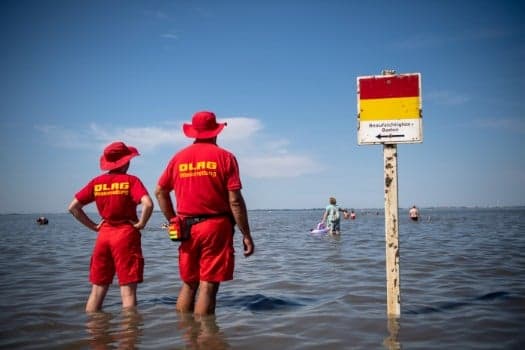German lifeguard service: 'Coronavirus won't stop guards saving drowning swimmers'

A recent report that lifeguards had been told it was up to them to make a judgement call on saving drowning people during the pandemic caused concern among readers. We talked to the lifeguard service to set the record straight.
"We are in a moral dilemma here," a lifeguard at the Baltic resort of Travermünde told DPA news agency on Saturday.
"We have to keep our distance so as not to endanger ourselves and others, but with a distance of 1.50 metres it is difficult to save someone from drowning."
The DPA report stated that: “Ultimately, each guard has to decide for himself what risk he wants to take.”
Understandably this led to some anxiety and confusion among readers.
“As if somebody drowning really cares about getting Corona from the ones saving him…,” one reader commented on Facebook.
Another said: “If that’s a dilemma, you really shouldn’t be a lifeguard!”
Swimming in Germany 'definitely not more dangerous' this year
Achim Wiese, spokesperson for the German Life Guards Association (DLRG), told the Local there was no need to worry about lifeguards not rescuing you due to fear about catching coronavirus.
“Ultimately it is always the choice of a lifeguard as to whether he saves someone in trouble in the water,” said Wiese.
“In a normal summer, if we raise a red flag - which signals a strong current or an impending storm - and someone goes swimming anyway, then the lifeguard has to make a judgement call. But I don’t know anyone who wouldn’t rescue the person,” he said.
Wiese confirmed that there are new rules that have been put in place to try and maintain social distancing between guards and swimmers. Lifeguards are now encouraged to use boats more in rescues or to swim out with boards so that the swimmer can lie on the board instead of being carried by the guard.
“We also ask the guards before they go on duty if they are prepared to take the risk of coming into close contact with people who need to be rescued. If they say no then we don’t put them on the beach this year,” Wiese said.
Swimming in German seas “is definitely not more dangerous” this year than in any other year, he said, “that is as long as you stick to swimming on beaches where lifeguards are watching the water".
According to the DLRG, 192 people drowned in Germany in the first seven months of the year, 63 more than in the same period last year.
The main reasons for the drowning, according to the data, were bathing on unguarded beaches, alcohol, carelessness and overestimation of one's own capabilities.
READ MORE: German lifeguards face moral dilemma during pandemic
Comments
See Also
"We are in a moral dilemma here," a lifeguard at the Baltic resort of Travermünde told DPA news agency on Saturday.
"We have to keep our distance so as not to endanger ourselves and others, but with a distance of 1.50 metres it is difficult to save someone from drowning."
The DPA report stated that: “Ultimately, each guard has to decide for himself what risk he wants to take.”
Understandably this led to some anxiety and confusion among readers.
“As if somebody drowning really cares about getting Corona from the ones saving him…,” one reader commented on Facebook.
Another said: “If that’s a dilemma, you really shouldn’t be a lifeguard!”
Swimming in Germany 'definitely not more dangerous' this year
Achim Wiese, spokesperson for the German Life Guards Association (DLRG), told the Local there was no need to worry about lifeguards not rescuing you due to fear about catching coronavirus.
“Ultimately it is always the choice of a lifeguard as to whether he saves someone in trouble in the water,” said Wiese.
“In a normal summer, if we raise a red flag - which signals a strong current or an impending storm - and someone goes swimming anyway, then the lifeguard has to make a judgement call. But I don’t know anyone who wouldn’t rescue the person,” he said.
Wiese confirmed that there are new rules that have been put in place to try and maintain social distancing between guards and swimmers. Lifeguards are now encouraged to use boats more in rescues or to swim out with boards so that the swimmer can lie on the board instead of being carried by the guard.
“We also ask the guards before they go on duty if they are prepared to take the risk of coming into close contact with people who need to be rescued. If they say no then we don’t put them on the beach this year,” Wiese said.
Swimming in German seas “is definitely not more dangerous” this year than in any other year, he said, “that is as long as you stick to swimming on beaches where lifeguards are watching the water".
According to the DLRG, 192 people drowned in Germany in the first seven months of the year, 63 more than in the same period last year.
The main reasons for the drowning, according to the data, were bathing on unguarded beaches, alcohol, carelessness and overestimation of one's own capabilities.
READ MORE: German lifeguards face moral dilemma during pandemic
Join the conversation in our comments section below. Share your own views and experience and if you have a question or suggestion for our journalists then email us at [email protected].
Please keep comments civil, constructive and on topic – and make sure to read our terms of use before getting involved.
Please log in here to leave a comment.